Calls To Oust Iran From UN Women's Commission Getting Stronger
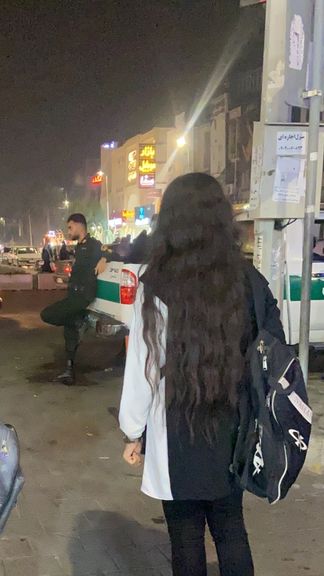
Calls for expulsion of the Islamic Republic from the UN Commission on the Status of Women (CSW) are getting stronger with the US and the Netherlands joining the chorus.

Calls for expulsion of the Islamic Republic from the UN Commission on the Status of Women (CSW) are getting stronger with the US and the Netherlands joining the chorus.
US Vice President Kamala Harris said on Wednesday that Washington will try to remove Iran from the 45-member CSW over the government's denial of women's rights and brutal crackdown on protests.
The Islamic Republic is just starting a four-year term on the commission, which meets annually every March and aims to promote gender equality and the empowerment of women.
"The United States believes that no nation that systematically abuses the rights of women and girls should play a role in any international or United Nations body charged with protecting these very same rights," Harris said in a statement.
"Iran has demonstrated through its denial of women's rights and brutal crackdown on its own people that it is unfit to serve on this Commission," Harris said.
On Tuesday, the Dutch Senate adopted a motion calling on its government to “support any proposal” to remove the Iranian regime from the UN Women’s Rights Commission.
UN Watch, an independent non-governmental human rights group based in Geneva, has drafted a resolution for the 54-nation UN Economic Social Council (ECOSOC) to remove Iran.
A group of women leaders in business, politics, and the arts from over 14 countries has called for the immediate expulsion of the Islamic Republic from the UN Commission.
In an open letter, published in The New York Times on Sunday, October 29, the preeminent leaders expressed their solidarity with Iranian women and girls, as well as men, who are holding daily protests for more than 40 days across the country and abroad following the death in custody of 22-year-old Mahsa Jina Amini.
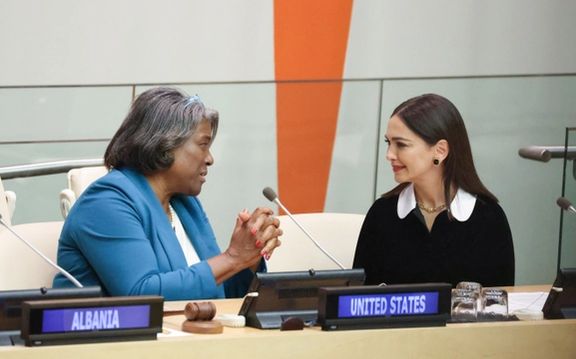
Nobel Prize winner Shirin Ebadi Wednesday urged the United States not to reach any agreement with Iran that would enable it to access additional funds.
While the lawyer has previously supported at least some sanctions against Tehran, Ebadi’s intervention comes not only after six weeks of protests in Iran but with the US in recent weeks showing hesitancy toward talks aimed at reviving the JCPOA (Joint Comprehensive Plan of Action). Under a restored JCPOA, Iran would gain access to funds frozen abroad and lifting of US sanctions in return for curbing its nuclear program.
Ebadi was addressing an ‘Arria’ meeting of the United Nations Security Council, an informal gathering sponsored by members of the council or other states to allow informative input from experts or non-state groups. The meeting was sponsored and introduced by US ambassador Linda Thomas-Greenfield and Albanian ambassador Ferit Hoxha to discuss weeks of protests in Iran following the September 16 death of Mahsa Amini after arrest by Tehran ‘morality police.’
Speaking virtually from London, Ebadi said the “demands for justice” by the Amini family had “so far yielded no results.” Ebadi called on “western governments and especially the United States of America to refrain from subscribing [to] any type of agreements that will help the survival of the regime, as the Islamic Republic does not spend the funds for the welfare of the people but on the contrary provides and buys more weapons, which in turn cause more killing in Iran and the region.”
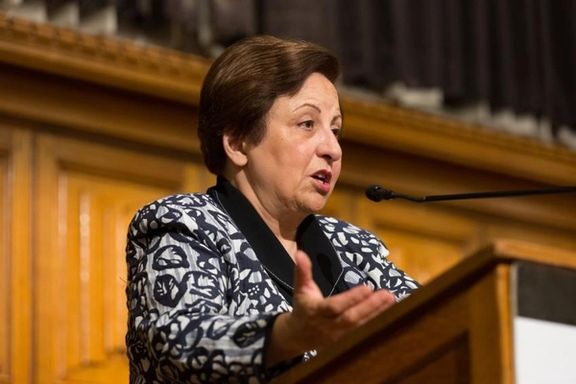
Ebadi, who left Iran in 2009, said the UN should set up an investigation into “recent repressions in Iran,” citing the 2017 precedent of Myanmar, and demanded the withdrawal of ambassadors of the “governments of the free world” from Iran with their representation reduced to charge d’affaires. She called for the removal of Iran from the UN Commission on the Status of Women, and for the establishment of a “democratic and secular government.”
Also addressing the Arria meeting virtually, the US Special Rapporteur on Human Rights in Iran Javaid Rehman highlighted an “absence of accountability” in Iran, arguing that official investigations into Amini’s death had “failed to meet the minimum [standards] required.”Rehman argued Iranian family law, the age of criminal responsibility, and employment practices were all discriminatory, creating a situation of “gender apartheid.”
‘Powder-keg moment’
Rehman called for an international “independent investigative mechanism” to investigate the state’s response to six weeks of protests, in which he said at least 277 people had been killed, including 67 in Sistan-Baluchestan province.
The third speaker, Iran-born Hollywood actress Nazanin Boniadi, who was present in New York, called Amini’s death a “murder” that had been “the powder-keg moment that ignited this most recent uprising.” She said that the slogan ‘Woman, Life, Freedom’ was a “declaration of opposition to a regime…built on being anti-women, pro-martyrdom, and repressive.”
Boniadi disputed the “myth…perpetuated by global pundits…that compulsory hejab is a cultural issue that we shouldn’t interfere with.” She also rejected “another myth, that this regime is reformable,” and argued that presidential and other elections could not “make a difference.” She said that “the potential for the current protests to transform Iran from theocracy to representative government could be a geopolitical game-changer, and the single most important key to bringing about stability in the Middle East.”
US ambassador Thomas-Greenfield, sitting in front of White House Special Envoy Rob Malley, said the US would support an international investigation into human rights in Iran, and had already sanctioned Iran’s ‘morality police.’ Arria meetings, first established in 1992 by Venezuelan Ambassador Diego Arria, have sometimes led to UN Security Council resolutions.
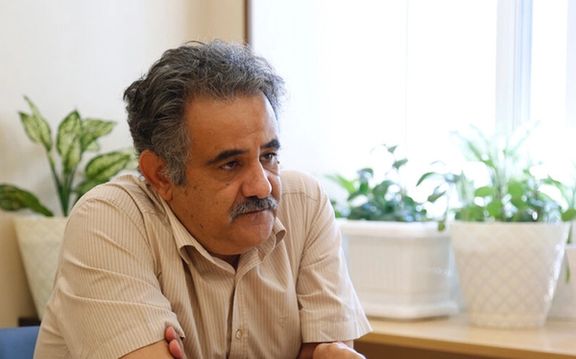
Iranian economist Davood Souri, an alumnus of the Virginia Polytechnic University and a tenured professor at Tehran’s Sharif University, has been arrested by the Islamic Republic’s agents.
According to reports, security agents raided Souri’s home on Monday night and took him along with his laptop and mobile phone. He later managed to call his family and inform them he was taken to the Evin prison.
Earlier in the week, an economics PhD candidate of the same university, Mohammad Mollanouri, was also arrested.
The Islamic Republic’s security agents have been arbitrarily arresting many academics and journalists who are not even known to be political activists. Most of the detained intellectuals have done nothing but sympathize with the current wave of protests, ignited by the death in custody of 22-year-old Mahsa Amini. Some of them have been released on bail.
On Sunday, Iranian plainclothes agents abducted Dariush Farhoud, an 85-year-old professor of medical and clinical genetics known as the father of Iran’s genetics and released him after about two days of interrogation.
More than 2,300 academics from US universities urged President Joe Biden on Tuesday to do more to support the antigovernment protesters in Iran.
On Wednesday, the new UN human rights chief Volker Turk said in his first media briefing since taking office that there was a worrying pushback against progress in easing rights abuses, above all on gender issues, pointing to the Islamic Republic’s violent clampdown.
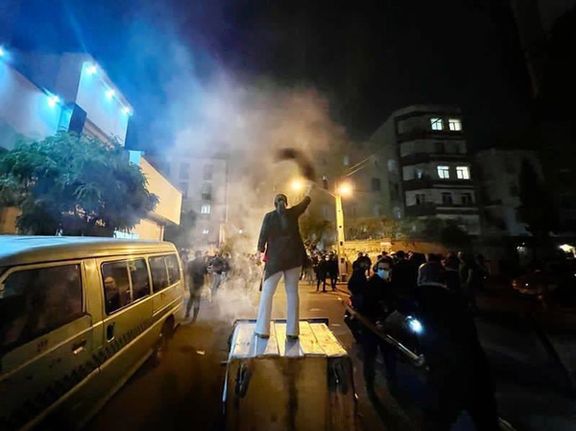
More than 2,300 academics from US universities have urged President Joe Biden to do more to support the antigovernment protesters across Iran.
In a letter sent to the president Tuesday, the academics, including more than 425 Iranian-American professors, called for “urgent attention to a dire situation in Iranian universities,” asking Biden to take “further tangible actions.”
They urged US president Joe Biden to “halt any and all negotiations with the Iranian regime, and prevent any sanctions relief under any pretext, directly or indirectly, until all violators of human rights in Iran are held accountable.”
The letter, signed by 10 Nobel laureates as well as many members of the Iranian diaspora, said that “An attack on the freedom of one university community is an attack on the freedom of all.”
Noting that demonstrations in more than 170 Iranian cities, including in over 100 universities, have been violently suppressed by the regime’s security forces since the outbreak of the uprising in Iran, they said that the repression is becoming harsher every day, and hundreds have been killed and thousands arrested so far.
“We also ask you to recognize the universally accepted right of the Iranian people to self-defense as they seek to attain sovereignty and self-determination,” they concluded.
In another similar measure, over 500 scholars launched a petition to demand the release of all activists, including students, from the prisons of the Islamic Republic, calling on the international scientific community to amplify the voices of those in Iran, scientific journal Nature reported.
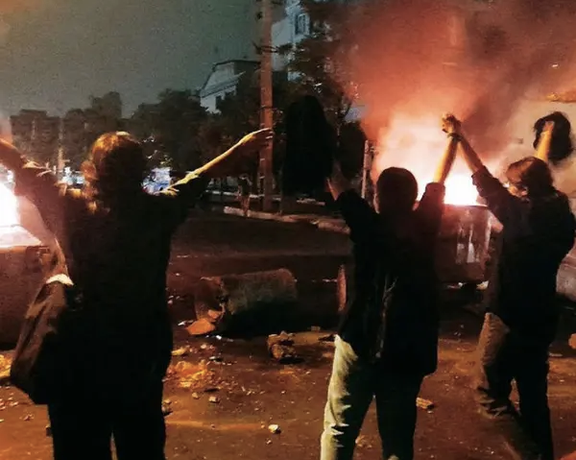
There is no let up in protests in Iran as demonstrations continue in various cities and activists call for more rallies and civil disobedience in the coming days.
In the capital Tehran, people chanted slogans behind windows and on rooftops Tuesday night, and some staged protest rallies in Tehranpars, Saadatabad, Ekbatan and Jannatabad districts.
Despite the unprecedented uprising against the Islamic Republic, Supreme Leader Ali Khamenei on Wednesday once again accused foreign nations of instigating protests across Iran saying that he has no problem with the youths who are on streets “as they are our own kids!”
“The presence of some teenagers and young people in streets is the surface of the issue. These are our own children, and we have no argument with them as they entered the field due to some excitements…, but the important ones are the main directors who entered with a plan,” added Khamenei.
Despite his claim about children, security forces so far have killed at least 40 teenagers and younger children.
Referring to the protest movement, he called it a “hybrid war” and not just “street riots” and once again blamed it on the United States, Israel, “some mean European powers,” claiming that “the nation slapped and defeated them.”
Dehloran is the latest city that joined the uprising. In Dehloran, on the border of Iran and Iraq, protesters lit fires and clashed with security forces Tuesday evening. Neighborhood-oriented protests continued in several cities, including Sanandaj, Bandar Abbas and Marivan.
People in the western flashpoint city of Sanandaj took to streets Wednesday morning chanting slogans against the clerical regime. Videos show merchants and shopkeepers across the city have gone on strike.
Meanwhile, students of Beheshti university of Tehran and Industrial University of Esfahan held gatherings chanting anti-government slogans.
Students of Hormozgan Medical Sciences University, Tehran Azad University, and Rasht Azad University have announced in a statement that they boycotted the courses and asked other students and professors to stand by them.
Dentistry students at Shiraz University staged a sit-in and in Shahr-e Rey Azad University near Tehran students defied the gender segregation at the cafeteria.
Schoolboys and girls in a number of cities, including Tehran, Karaj and Marivan, chanted slogans against Supreme Leader Ali Khamenei.
In Karaj near capital Tehran, people hung placards to call for a march to the city cemetery on Thursday.
According to the latest information by Iran Human Rights, at least 277 people have been killed by security forces in the nationwide protests so far. Of those, 40 were under 18 years of age but have not all been verified through document evidence.
“Protesters have been killed in 22 provinces, with the most reported in Sistan and Baluchistan, Mazandaran, Tehran, Kurdistan and Gilan respectively. The greatest number of deaths were recorded on 21, 22 and 30 September. October 27 was the bloodiest day last week with 12 recorded deaths,” says the organization.
The Norway-based human rights organization also expressed concern regarding the fate of the detained protesters saying, “dozens of them have been charged with the security-related charges of ‘moharebeh’ (enmity against God) and ‘corruption on earth’ which carry the death penalty.
The Islamic Republic’s history and current evidence indicate that they intend to use the death penalty as a tool of political repression to intimidate their opposition.
However, the Judiciary deputy Mohammad Mossadeq claimed on Wednesday he does not know how many people have been arrested in recent protests. “I don't know, but more than 90 percent of the detained were released after 24 hours,” he said.
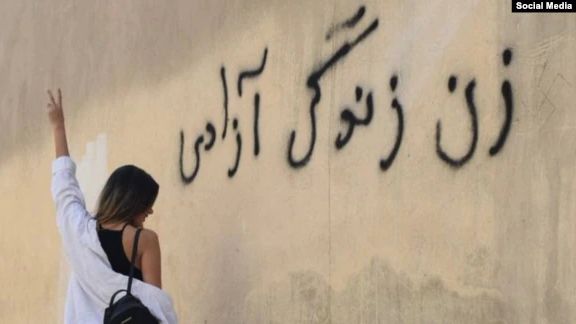
An Iranian lawmaker from western Iran says at least six protesters have been killed in the northwestern city of Mahabad during the past three days.
In an interview with Rudaw news channel, Jalal Mahmoudzadeh, the representative of Mahabad in the parliament, said these civilians were killed by the direct fire of the security forces.
Mahmoudzadeh further added that he is going to question the interior minister about the results of his investigation into these deaths.
This MP’s remarks come as the Norway-based Iran Human Rights Organization says at least 18 people have been killed in West Azerbaijan province since the beginning of the nationwide protests.
Mahabad in West Azarbaijan province, with a large Kurdish population, has been the hotbed of fierce clashes between anti-government protesters and security forces within the past few days.
Last Thursday, large crowds took to the streets in this city taking control of the governorate and some other buildings. It was after the funeral ceremony of 35-year-old Esmail Moloudi who had been killed during protests the night before.
Meanwhile, the protests against clerical rule continued on Tuesday despite the threats by the authorities. University students across the country staged strikes, sit-ins, and demos to vent anger at government’s inhumane policies.
In Tehran, universities of Beheshti, Sharif, Al-Zahra, Amirkabir, Kharazmi, Allameh, Azad North, and Azad East were the scene of anti-government protests mostly calling for the release of the detained students.
In Amol, Esfahan, Yazd, Mashhad and other cities the students also held sit-ins and chanted slogans against the Islamic Republic.
The students at the Mashhad University of Journalism announced that they will not attend classes until further notice due to the arrest, threat and suspension of students across the country.
Videos received by Iran International show students at Tehran’s Beheshti University chanting, “The university has become a prison, at Sharif, Beheshti, and Tehran...”
Reports say within the past few days, the security office at Malayer University in Hamedan province has threatened to suspend and expel nearly 200 students.
In addition to universities, school students also held protests and chanted slogans on Tuesday.
Social media videos show the female students in Karaj and Shahryar near Tehran poured into streets chanting “All these years of crime, death to this leader [Khamenei].”
Another video shows schoolgirls in Sanandaj march shouting “Women, Life, Freedom.”
Reports coming from Sistan and Baluchestan province in the southeast say on Tuesday hundreds of citizens prevented the extraction of gold from the Taftan mine.
Taftan is one of the largest gold mines in Iran, but the people declared “this mine belongs to the Baluch nation, and they will never allow the wealth of Baluchistan to be extracted and spent by outsiders.”
The total amount of gold that can be extracted from the mines in the province is estimated to be 38 tons, but only 12 to 13 percent of the native people have been able to work in these mines. Some clan chiefs said Tuesday that “We will be buried here, but we won’t let you loot the mines.”
At the same time, Molavi Abolhamid, the Sunni Imam of Zahedan, addressed the government in a tweet saying “For 43 years, with the support of the good people of Iran, the government has worked; now when the people are weary of the actions of officials, should we resort to repression, force and violence? Have you thought that you will have to live with these people in the future?”
In the meantime, the Youths of Tehran and Tabriz Neighborhoods called on people to hold anti-government demonstrations on Wednesday November 2 in all cities.
“The child-killing and brutal regime should not assume they can continue the crime and killing forever! Let Khamenei and his followers know they must pay for all the blood they have shed,” their statement released on social media said.